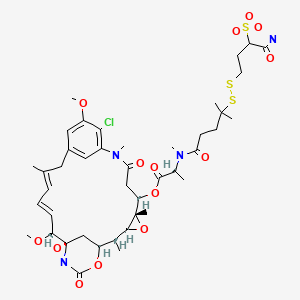Attribution Statement: LactMed is a registered trademark of the U.S. Department of Health and Human Services.
NCBI Bookshelf. A service of the National Library of Medicine, National Institutes of Health.
Drugs and Lactation Database (LactMed®) [Internet]. Bethesda (MD): National Institute of Child Health and Human Development; 2006-.
CASRN: 1453084-37-1

Drug Levels and Effects
Summary of Use during Lactation
No information is available on the clinical use of mirvetuximab soravtansine during breastfeeding. Because mirvetuximab is a large protein molecule with a molecular weight of 150,000 Da, the amount in milk is likely to be very low.[1] It is also likely to be partially destroyed in the infant's gastrointestinal tract and absorption by the infant is probably minimal.[2] However, mirvetuximab is conjugated with the small-molecule toxin, mafodotin, which might be excreted into milk. The manufacturer recommends that breastfeeding be discontinued during therapy and for 1 month after the last dose.
Drug Levels
Maternal Levels. Relevant published information was not found as of the revision date.
Infant Levels. Relevant published information was not found as of the revision date.
Effects in Breastfed Infants
Relevant published information was not found as of the revision date.
Effects on Lactation and Breastmilk
Relevant published information was not found as of the revision date.
References
- 1.
- Stratigakis A, Paty D, Zou P, et al. A regression approach for assessing large molecular drug concentration in breast milk. Reprod Breed 2023;3:199-207. doi:10.1016/j.repbre.2023.10.003 [CrossRef]
- 2.
- Anderson PO. Monoclonal antibodies during breastfeeding. Breastfeed Med 2021;16:591-3. [PubMed: 33956488]
Substance Identification
Substance Name
Mirvetuximab Soravtansine
CAS Registry Number
1453084-37-1
Drug Class
Breast Feeding
Lactation
Milk, Human
Immunoconjugates
Antibodies, Monoclonal, Humanized
Antineoplastic Agents
Disclaimer: Information presented in this database is not meant as a substitute for professional judgment. You should consult your healthcare provider for breastfeeding advice related to your particular situation. The U.S. government does not warrant or assume any liability or responsibility for the accuracy or completeness of the information on this Site.
- User and Medical Advice Disclaimer
- Drugs and Lactation Database (LactMed) - Record Format
- LactMed - Database Creation and Peer Review Process
- Fact Sheet. Drugs and Lactation Database (LactMed)
- Drugs and Lactation Database (LactMed) - Glossary
- LactMed Selected References
- Drugs and Lactation Database (LactMed) - About Dietary Supplements
- Breastfeeding Links
- PubChem SubstanceRelated PubChem Substances
- PubMedLinks to PubMed
- Review Ado-Trastuzumab Emtansine.[Drugs and Lactation Database (...]Review Ado-Trastuzumab Emtansine.. Drugs and Lactation Database (LactMed®). 2006
- Review Belantamab Mafodotin.[Drugs and Lactation Database (...]Review Belantamab Mafodotin.. Drugs and Lactation Database (LactMed®). 2006
- Review Pembrolizumab.[Drugs and Lactation Database (...]Review Pembrolizumab.. Drugs and Lactation Database (LactMed®). 2006
- Review Vilobelimab.[Drugs and Lactation Database (...]Review Vilobelimab.. Drugs and Lactation Database (LactMed®). 2006
- Review Naxitamab.[Drugs and Lactation Database (...]Review Naxitamab.. Drugs and Lactation Database (LactMed®). 2006
- Mirvetuximab Soravtansine - Drugs and Lactation Database (LactMed®)Mirvetuximab Soravtansine - Drugs and Lactation Database (LactMed®)
- Conserved Domain Links for Protein (Select 2217392264) (1)Conserved Domains
Your browsing activity is empty.
Activity recording is turned off.
See more...
